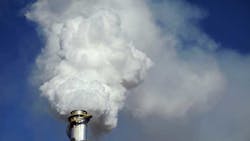Will Canada Meet Its 2020 Target to Cut Greenhouse Gas Emissions? Not Likely
OTTAWA - Canada will fail to reach its target for reducing greenhouse gas emissions by 2020, the environment commissioner said Tuesday.
Ottawa had vowed to reduce carbon emissions by 17% of 2005 levels -- matching the United States' target in a concerted continental approach to climate mitigation.
But Environment Commissioner Julie Gelfand, an independent parliamentary officer, said in a report to Parliament that Ottawa has no plan in place to cut emissions.
Furthermore, regulations to reduce emissions from the oil and gas sector -- a significant source of carbon emissions in Canada -- have been repeatedly delayed, she said.
"There is strong evidence that Canada will not meet its international 2020 greenhouse gas emission reduction target," Gelfand told a press conference.
"The federal government does not have an overall plan that maps out how Canada will achieve this target, and Canadians haven't been given the details about which regulations will be developed, when nor what greenhouse gas reductions will be expected."
Washington, meanwhile, has said it would meet its target and is already planning deeper cuts post-2020.
Environment Canada forecast that the Canadian oil and gas sector's contribution to national emissions will rise to 200 megatonnes by 2020.
This is 27 megatonnes more than in 2012 and a larger increase than any other sector.
"Despite this prediction, regulations for the sector have been repeatedly delayed," said Gelfand in her report.
The report also says the government could do more to monitor the impact of developing the Alberta oil sands on air and water quality, and biodiversity.
Ottawa also could make marine navigation in the Canadian Arctic safer and minimize environmental risks, she said, by deploying more icebreakers and improving navigational charts.
Copyright Agence France-Presse, 2014
About the Author
Agence France-Presse
Copyright Agence France-Presse, 2002-2025. AFP text, photos, graphics and logos shall not be reproduced, published, broadcast, rewritten for broadcast or publication or redistributed directly or indirectly in any medium. AFP shall not be held liable for any delays, inaccuracies, errors or omissions in any AFP content, or for any actions taken in consequence.
